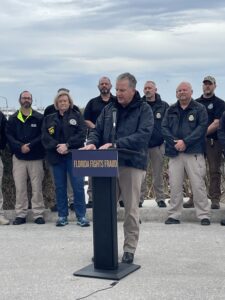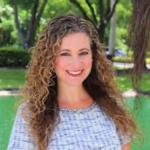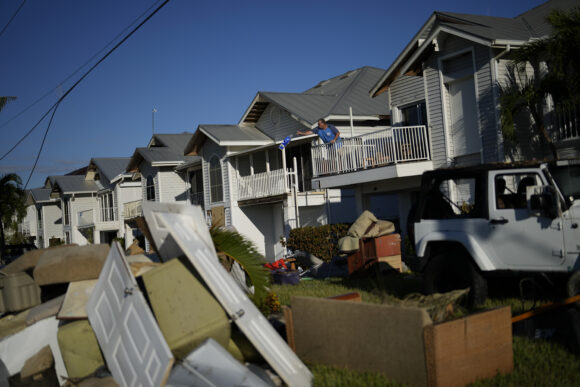In the wake of Hurricane Ian, Florida’s chief financial officer has taken a hard line on insurance claims litigation, calling for an outright ban on assignments-of-benefits agreements.
At a press conference in Cape Coral, a city hit hard by the hurricane this month, and in a statement Wednesday, CFO Jimmy Patronis also urged Florida lawmakers to establish a statewide insurance fraud prosecutor and to disincentivize public adjusters after a storm
“We have bad public adjusters swarming impacted areas, soliciting, and trying to make a quick buck,” Patronis said. “Not only do individuals need more time to get out of a public adjuster contract during a state of emergency, we need to reduce the percentage a public adjuster is entitled to immediately following a storm, ensuring their motives are aligned with helping Floridians get back on their feet.”

Patronis, whose Department of Financial Services regulates adjusters, did not say what he based the “bad adjusters” assertion on. But some Florida insurers have long complained about public adjusters working closely with contractors and promising homeowners free roofs after a windstorm, leading to exaggerated claims and litigation.
The CFO also did not provide details on his proposed schedule of fees for adjusters.
The call for an end to assignments of benefits, or AOBs, has already met with support from one insurance industry leader.
“We commend the CFO for calling attention to ongoing abuse of assignment-of-benefits tools by shady vendors whose goal is profit above all else,” said Michael Carlson, president of the Personal Insurance Federation of Florida, which represents a number of insurance carriers. “Eliminating post-loss assignments that transfer consumer rights to vendors is a good idea. We also believe that addressing exorbitant public adjuster fees is another good idea and a means to reduce predatory behavior by these licensees.”
Several Florida insurance executives in recent years have called for statutory changes that would allow insurance policies to bar AOB agreements, noting that thousands of lawsuits in recent years have resulted from disputed AOB claims. Data from CaseGlide, a litigation management software firm, shows that as much as 41% of litigated claims against Florida’s largest insurers resulted from assignees of benefits, usually from restoration contractors. In July, the AOB share of new litigations reached an 18-month high, the company said. That came despite 2019 Florida legislation that aimed to reduce AOB suits.
A number of other states allow insurance policies to include non-assignment of benefits clauses.
Carlson said that claims litigation is “the storm after the storm,” and that one-way attorney fees also need to be addressed to disincentivize unnecessary lawsuits.
The Florida Association of Public Adjusters pushed back on Patronis’ agenda.
“We are concerned that the recent release misrepresents the important role and work of licensed public adjusters,” FAPIA President Chris Cury said in a statement Thursday.
Instead of bad actors in the hurricane zone in southwest Florida, “it appears there is a focus on lawful and licensed insurance professionals who are truly working to help policyholders in their time of need.”
Cury noted that, following a declared emergency, adjuster fees already are limited to no more than 10% of any claim made in the first year after the loss.
“Licensed public adjusters, who are regulated by the Department of Financial Services, adhere to strict standards and continue to serve in an essential capacity for the sake of policyholders,” Cury said.
Insurance industry advocates have often blamed the adjusters for advertising heavily after storms and encouraging inflated claims. Insurance agents have reported that homeowners in the Hurricane Ian strike zone have fielded dozens of calls and door-knocks from public adjusters. But some adjusters and claimants’ attorneys have maintained that public adjusters help homeowners achieve a fair payout on claims, while insurance companies sometimes try to minimize the extent of damages.

“The insurance company has adjusters trained to interpret policies and assess a loss but want to preclude an insured from retaining professionals to assist them in doing the same,” said West Palm Beach attorney Gina Clausen Lozier, who has represented policyholders in claims disputes.
She pointed out that many insurance policies require insureds to submit statements within a short timeframe attesting to the amount of losses. Failure to submit can result in denial of the claim. If it’s overstated, insurers have been known to allege fraud. A public adjuster can help provide a timely estimate.
Lozier agreed that Florida’s insurance market is facing a number of problems, but said that licensed adjusters are not to blame.
“The public adjusting industry in Florida is highly regulated, despite ongoing insinuations that public adjusters are operating without legal or ethical restraints by ‘preying’ on insureds,” she said.
Patronis did not call for another special session of the Florida Legislature to adopt his reform ideas, as some industry advocates have done, but referred to “this coming legislative session.” The 2023 regular session begins in March.
Patronis also reiterated his call for a $3 million anti-fraud and public education campaign.
“Policyholders need to understand what they are signing, and that litigation will only slow down their claims and could result in liens on their property,” Patronis said.
About the photo: Snowbird Bob Fennessey of Montreal, Canada, clears out storm-damaged items from his condo, as ruined furniture and a car from his neighbors’ vacation home sits on the lawn, after storm surge filled the first story of their houses during the passage of Hurricane Ian, near San Carlos Boulevard in Fort Myers Beach, Fla., Sunday, Oct. 2, 2022. (AP Photo/Rebecca Blackwell)
Was this article valuable?
Here are more articles you may enjoy.


 AI Got Beat by Traditional Models in Forecasting NYC’s Blizzard
AI Got Beat by Traditional Models in Forecasting NYC’s Blizzard  AIG’s Zaffino: Outcomes From AI Use Went From ‘Aspirational’ to ‘Beyond Expectations’
AIG’s Zaffino: Outcomes From AI Use Went From ‘Aspirational’ to ‘Beyond Expectations’  Explosive Wildfires Surge Through Oklahoma Panhandle and Kansas
Explosive Wildfires Surge Through Oklahoma Panhandle and Kansas  NYC Travel Snarled by Snow as Central Park Gets 15 Inches
NYC Travel Snarled by Snow as Central Park Gets 15 Inches 